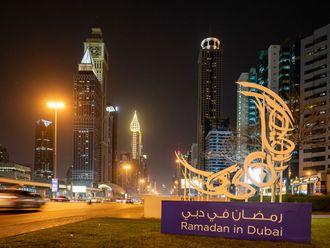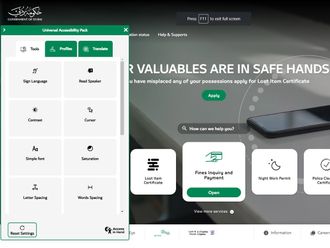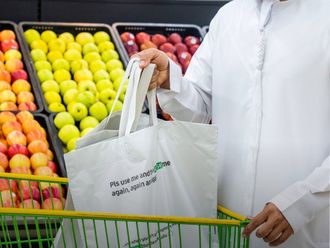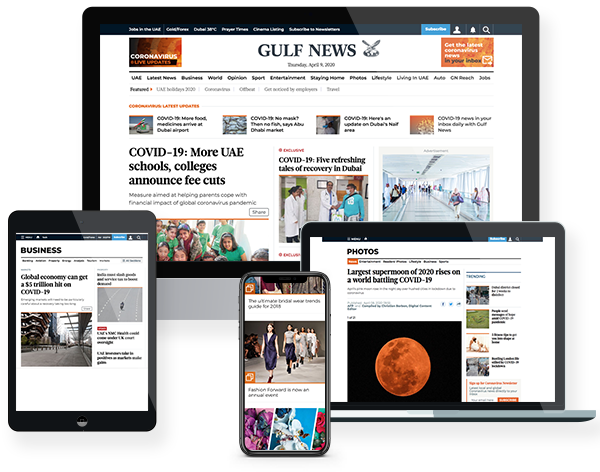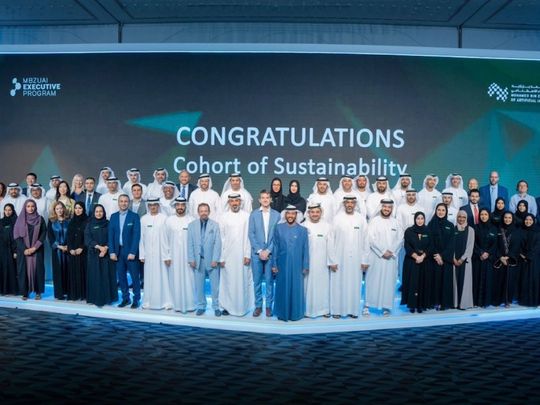
Abu Dhabi: This week, Mohammed bin Zayed University for Artificial Intelligence (MBZUAI) celebrated the graduation of the fourth batch of executive directors, including leaders and executives in various institutions, authorities and departments in the United Arab Emirates.
Forty-two of the leaders of these institutions in the UAE became the fourth graduated batch from the Executive Program of Mohammed Bin Zayed University for Artificial Intelligence (MBZUAI).
The executives spent 12 weeks with world-leading AI trainers immersed in the potential of AI to transform society, with a focus on enhancing sustainability.
The programme’s fourth edition consisted of leaders from diverse organisations, including the Statistics Centre Abu Dhabi, Mohammed bin Rashid School of Government, the Supreme Council for National Security, Zayed Higher Organisation for People of Determination, Abu Dhabi National Oil Company, Price Water House Coopers and IBM, to name just a few.
The culmination of the programme delivered a set of capstone projects where participants applied their learnings to enhance sustainability, supporting the UAE’s Year of Sustainability. These include the following:
- The development of an AI-powered observatory to help secure the UAE’s food and water security
- A system for the prevention of online child exploitation
- Platforms for the screening, early detection, and diagnosis of autism spectrum disorder and other chronic diseases
- A system to ensure the sustainability and resilience of critical supply chains, and
- An initiative to boost productivity, efficiency and informed decision-making through certified training in AI.
A new generation of pioneers
Timothy Baldwin, MBZUAI Acting Provost and Professor of Natural Language Processing, who gave the keynote address at the graduation, said: “The fourth cohort of leaders to graduate from the MEP represents a new generation of pioneers and advocates for the ethical and responsible use of AI, a transformational tool that has the potential to become one of humanity’s greatest achievements.
He added: “Your decision to investigate and embrace the opportunities AI offers in the context of sustainability attests to your desire to become leaders in an innovative and ambitious country built on the belief that the future holds even greater opportunity than the past. You are the UAE’s next generation of ambassadors for ethical innovation, and the architects of a future where technology and sustainability work in harmony.”
“The programme’s trainers focused on explaining the potential of artificial intelligence in serving society, especially in the field of supporting sustainability, and the program culminated in a group of graduation projects, in which participants applied the knowledge they had acquired to support the efforts of the Year of Sustainability in the United Arab Emirates.
"These projects included the development of an artificial intelligence-based observatory to help ensure food and water security in the country, a system to prevent online child exploitation, screening and early detection and diagnosis platforms for autism spectrum disorder and other chronic diseases, a system to ensure the sustainability and resilience of vital supply chains, and an initiative to enhance productivity, efficiency and take action. Data-driven decisions through certified training in the field of artificial intelligence.” Baldwin explained.

The MEP teams presented their capstone projects at the graduation ceremony. The judging panel chose the winner for proposals aimed at helping the UAE take a proactive approach to tackling food security and supporting the nation’s 2051 Food Security Strategy.
The team pitched the idea of a National Food and Water Security Observatory to use AI to provide real-time insights and proactive decision-making around all key aspects of food security, from weather patterns and their impact on harvests through to supply chain issues, population growth and extreme weather events.
Five Projects
The judges were similarly impressed with the other five projects, including two health-related solutions: Team GovSync proposed Omniya, an ecosystem that uses AI to check and collate data for the early detection and diagnosis of autism spectrum disorder. While team Hayaati proposed an AI solution to assist the healthcare sector proactively detect non-communicable diseases by overcoming current inefficiencies and inadequacies in data collection.
As part of the AI community engagement and the strengthening of the network of the ambassadors of the MBZUAI Community, participants visited the Abu Dhabi Housing Authority (ADHA), Zayed Higher Organization for People of Determination, and Abu Dhabi Public Health Centre (ADPHC) in addition to engaging in classroom-based learning and developing their capstone projects.
More than 166 executives have graduated since the program’s launch in 2021.



